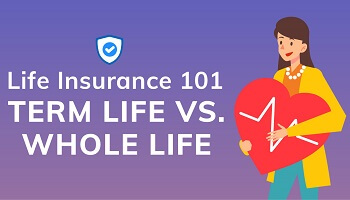How Life Insurance Works To Protect Your (And Your Children’s) Happiness
We all know that life insurance is important, especially when you have young ones at home. But with so many types of life insurance plans available, things can get confusing.
At its most basic, life insurance provides payouts and benefits should you die or suffer certain devastating events, like total and permanent disability (TPD) or critical illnesses (CI). These serve to provide the financial means for you and your dependents to carry on with day-to-day life, thus protecting your loved ones from facing great financial hardship.
If you delve deeper into life insurance plans, you’ll come across other terms, like term life, whole life, critical illness, cash value – there’s a lot to digest! Here we look into what all this means for you and your family.
Term Life vs Whole Life Insurance
Life insurance can be categorised into two main types: term or whole life insurance.
Term life insurance plans cover you for a set period of time, called the policy term, usually up to a certain age or for a certain number of years. If you should die (or suffer a TPD and/or CI, depending on your plan) during your policy term, your insurer will pay you a fixed sum of money (sum assured). At the end of your policy term, the policy coverage ends with no cash value.
On the other hand, whole life insurance plans offer protection for your whole life, plus enable you to build up cash value. Just like in term life insurance, a lump sum is paid out should you die (or suffer a TPD and/or CI, depending on your plan). The key difference is that a portion of the premiums you pay is invested in a participating fund. This accumulates cash value over time, growing your wealth.
Which of these will best keep your family happy and protected? Here’s what to consider.
What protection do you want?
As mentioned earlier, life insurance plans are meant to payout in case of death, TPD or critical illness. Critical illness here refers to a set list of 37 illnesses and diseases, defined by the Life Insurance Association of Singapore.
In Singapore, most plans will specify which stages of the critical illnesses they will provide coverage for – early, intermediate or advanced stage.
When looking at life insurance plans, take note of what stages of CI are covered and ensure that the coverage provided meets your protection needs.
Just protection or protection with wealth accumulation?
If you’re only looking for protection against life’s uncertainties, consider a term life insurance plan. With its payouts in case of death, TPD or critical illness, you and your family will be well prepared for the worst case scenario. A plan you can consider is Income’s Star Term Protect.
Star Term Protect provides affordable coverage and guaranteed renewal1 of your policy, with coverage up to a maximum age of 84 years (last birthday). You’ll also be able to reduce out-of-pocket expenses with the optional Hospital CashAid rider in the event of hospitalisation.
If you're seeking comprehensive protection combined with financial growth, consider a whole life insurance plan like Income's Complete Life Secure. This plan offers the option to choose a Multiplier Cover2,3 of up to 500% of the sum assured till the age of 65, 75, or 80, covering death, terminal illness and total and permanent disability. With Flexi Cash Access4, you can choose to receive annual cash payouts for an extra boosts to help with whatever comes your way by converting a portion of your Complete Life Secure policy's sum assured from age 50. You have the flexibility to choose your payout duration from as short as 10 years to the age of 100.
For added peace of mind, supplement your plan with the Early Critical Secure5 and Advanced Critical Secure riders6, which covers up to 159 conditions, including early, intermediate and advanced stage dread diseases5,6,7.
What will you be able to afford in the long run?
As life insurance is designed to protect you over a long period of time, it’s important to ensure your premium is affordable. Look for a plan which gives you as close to the amount of coverage you need as possible, while keeping within what you think is an affordable premium. The last thing you want is to find yourself unable to maintain your life insurance plan after a few years.
If in doubt, connect with an Income Advisor for expert advice on how to determine a budget for your insurance needs and guidance on selecting the best plans for yourself.
Make a well-informed decision to protect your family’s happiness
When you buy life insurance, it goes beyond personal benefit or even protecting your own finances. Life insurance can actually protect the happiness of the ones who depend on you. By insuring your life and against critical illness, you’re ensuring that you and your family will never have to face the financial strain that leads to choosing between “nice-to-have”s that bring the family happiness, and the daily necessities such as every day expenses and treatment costs. You won't know when life's uncertainties will strike. Life insurance can act as a safety net that ensures you will never need to put a pause on the things that makes your child and family happy in the event of unfortunate events.
Find out more about the ways in which you can protect your family’s happiness with a life insurance plan for yourself here.
1 Guaranteed renewal is applicable only if there is no claim on your policy during the policy term and the insured is age 79 (last birthday) and below. We will renew your policy for the same sum assured and policy term. However, if the insured’s 84th birthday falls within the next policy term, we will only renew it for a shorter term (in multiples of 5 years) such that the renewal term will not exceed the insured’s 84th birthday. The renewal premium will be determined by Income and is based on the policy’s renewal term, sum assured and the age of the insured at the time the policy is renewed.
2 Multiplier cover means a percentage of the sum assured shown in the policy schedule. The Multiplier Cover is applicable before the anniversary immediately after the insured reaches the age of 65, 75 or 80 (whichever is applicable).
3 Complete Life Secure includes a non-participating regular premium compulsory rider, Complete Life Secure – Protection Benefit. It pays the Retrenchment Benefit and part of the Multiplier Cover. Please refer to the policy conditions for further details.
4 You may exercise the Flexi Cash Access option to use a percentage of the basic policy’s sum assured for its cash value to receive an annual cash payout.
The request to exercise this option must be made at least 30 days before each anniversary, starting from the anniversary:
- the insured turns age 50; or
- the premium term ends and all premiums have been fully paid, whichever is later.
The cash payout will start from the anniversary immediately following our acceptance of the request and will be paid on an annual basis.
You must fulfil the following criteria in order to exercise the option:
- this is not a paid-up policy;
- you do not have any policy loan on this policy;
- the percentage of the basic policy’s sum assured you are using must be within the range of percentage determined by us; and
- the basic policy must meet the minimum sum assured requirement and the cash payout must meet the minimum amount as determined by us.
In the event the basic policy’s sum assured has been reduced because of accelerated payment, the cash payout will continue until the basic policy’s sum assured becomes zero. We reserve the right to adjust the cash payout in the event of any claims paid under the policy. Please refer to the policy conditions for further details.
5 Any payment made for Dread Disease Benefit under this rider will form an accelerated payment, and reduce the sum assured and any bonuses of this rider and its basic policy by the same amount that we pay under this rider.
For policies issued by us that include early and/or intermediate dread disease of the same dread disease, we will pay no more than $350,000 for the same dread disease for each insured (no matter how many policies we have issued to cover each insured).
Please refer to the policy conditions for further details.
6 Any payment under this rider will form an accelerated payment, and reduce the sum assured and any bonuses of this rider and its basic policy by the same amount that we pay under this rider. Please refer to the policy conditions for further details.
7 The total benefits (in relation to any dread disease benefits or equivalent benefits) under all policies, whether issued and paid by us or any other insurer, cannot be more than $3.6 million (including premiums waived due to dread disease but excluding bonuses) (“Dread Disease Per Life Limit”). Please refer to the policy conditions for further details.
This article is meant purely for informational purposes and does not constitute an offer, recommendation, solicitation or advise to buy or sell any product(s). It should not be relied upon as financial advice. The precise terms, conditions and exclusions of any Income Insurance products mentioned are specified in their respective policy contracts. Please seek independent financial advice before making any decision.
These policies are protected under the Policy Owners’ Protection Scheme which is administered by the Singapore Deposit Insurance Corporation (SDIC). Coverage for your policy is automatic and no further action is required from you. For more information on the types of benefits that are covered under the scheme as well as the limits of coverage, where applicable, please contact Income Insurance or visit the GIA/LIA or SDIC websites (www.gia.org.sg or www.lia.org.sg or www.sdic.org.sg).
This advertisement has not been reviewed by the Monetary Authority of Singapore.









